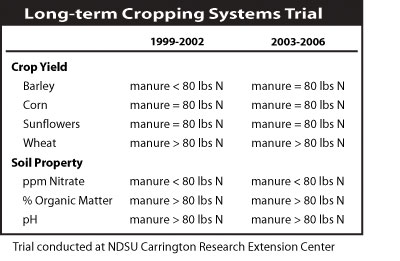
A cropping systems trial at North Dakota State
University’s (NDSU) Carrington Research Extension Center shows manure
has promise as fertilizer and is beneficial to the soil.
A cropping systems trial at North Dakota State University’s (NDSU) Carrington Research Extension Center shows manure has promise as fertilizer and is beneficial to the soil.
 |
The research also shows long-term manure use has a positive impact on soil chemical properties, says center nutrient management specialist Ron Wiederholt.
Center researchers have been conducting a cropping systems trial since 1987 to compare crop rotations, tillage and fertility treatments. The fertility treatments include an annual supply of 40 and 80 pounds of commercial nitrogen per acre and beef feedlot manure at 40 pounds of nitrogen per acre. The tillage treatments include no till, minimum till and conventional till.
“Since the inception of the trials, a lot of data has been gathered and some trends are starting to materialize,” says Wiederholt. “Using data from 1999 through 2006, the behavior of the manure-treated crops versus those fertilized with commercial fertilizer is very interesting.”
During that eight-year period, the yield of nonleguminous crops, including barley, corn, sunflowers and hard red spring wheat, grown under the manure treatment were at least equal to and in some instances out-yielded crops grown with commercial nitrogen treatments.
“This fact is not too surprising until you realize that the manure applied at a rate of 40 pounds of nitrogen per acre behaved similarly to or better than the 80 pounds per acre commercial nitrogen treatment,” says Wiederhol. “In only one time period (1999-2002) and for one crop (barley), yields obtained from the manure treatments were less than for the 80 pounds of commercial nitrogen per acre treatments.”
Wiederholt says what is even more interesting is the impact manure had on soil chemical properties during the same time. One result that may help explain why the crop yields from the manure plots were competitive with crops with a higher rate of commercial nitrogen is that soil organic matter levels in the manure-treated plots were significantly higher than levels in commercially fertilized plots.
“When you throw tillage into the mix, the soil organic matter levels also are significantly higher for no till and manure than any of the other treatments,” he says.
The soil nitrate levels at all depths sampled were significantly lower for the manure plots versus the 90 or 45 pounds per acre commercial nitrogen treatments, showing a more efficient use of nitrogen by the crops fertilized with manure. Soil pH (alkalinity or acidity) for the manure plots also was significantly higher than in the commercially fertilized plots.